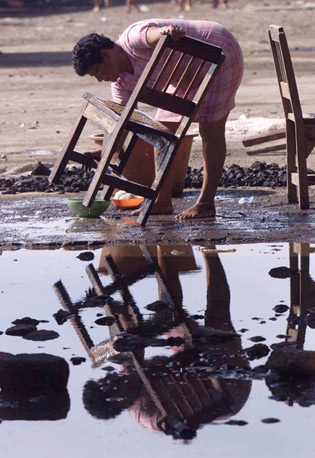Swept Away
Women and Natural Disasters
In another report that same year, the Global Fund for Women pointed out that escaping death in natural disasters didn't necessarily leave women in the clear.
"The reason women are more vulnerable in disasters is that they are more vulnerable prior to disasters," says Kavita Ramdas, President and CEO of the Global Fund for Women, a foundation that support women's groups worldwide. "The gender inequalities that define their lives prior to a disaster are really what put them at such great increased risk after a disaster."
Suffering after Survival
Disaster relief efforts often do not include adequate health care for women. Pregnant women do not receive obstetrical care, causing some to miscarry or deliver in unsanitary conditions. Displaced women lack access to contraception, undergarments and sanitary supplies. Women's psychological trauma goes untreated, as they scramble to care for affected children and elders first.
Supplies are often allocated per-adult only, forcing mothers to share rationed supplies of blankets, food and water among themselves and their children.
At Risk for Violence
Following the chaos and social breakdown that accompany natural disasters, women are vulnerable to domestic violence, sexual abuse and rape. The Global Fund for Women reports that problems of violence can be worse in regions with prior histories of social conflict. Their report "Caught in the Storm" cites: "In cases where soldiers and displaced women are from different political or ethnic groups, those who should be protectors may instead become predators."
New Economic Burdens
After a disaster, women are expected to carry on traditional duties of childcare and nursing the wounded, but often also have to take on the burden of providing financial support, especially if their male partners have died or been injured. Since they are often not free to relocate to find work, they are vulnerable to poverty, hunger, forced marriage, labor exploitation and trafficking into the sex trade.
Single mothers often have few resources to draw upon to rebuild their lives. When New Orleans flooded after Hurricane Katrina, 41 percent of all female-headed households in the region, mostly of women of African American, Vietnamese American or Native American descent, were already living in poverty.
Excluded from Planning
Research has found that women are often the first to mobilize in the face of disasters but then are left out of short-term disaster relief planning or prevention of future disasters in the long run. For example, in Sri Lanka planning commissions built temporary houses without women's input -- and the homes were built without any kitchens or provisions for cooking.
From Victims to Leaders
While women clearly suffer more after natural disasters, Kavita Ramdas explains that women also serve as community leaders.
"Our hope at the Global Fund for Women is to be able to identify local women's organizations and put them in touch with some of the major international NGOs that are doing relief work," says Kavita Ramdas. "We're helping to identify leaders in local communities who can really be a part of this work from the get-go, and not just after the disaster has occurred."
Hurricanes and Hammers
One such group is Nicaragua's Mujeres Constructoras, founded in 1987. The organization trains poor Nicaraguan women in welding, construction, and carpentry, empowering them with job options beyond badly paid domestic and agricultural work.
When Hurricane Mitch struck in 1998, Mujeres Constructoras' headquarters in the town of Condega was awash with water. Machines rolled out through the water-soaked barrios and repair began. In the aftermath of the hurricane, Mujeres Constructoras built 32 houses for single mothers and their families whose homes had been destroyed. These homes were stronger and sturdier than those that had been destroyed, and the training of the construction workers came full circle. Women who could once only do isolated construction tasks could now build entire homes; their contribution to disaster relief was irreplaceable.


